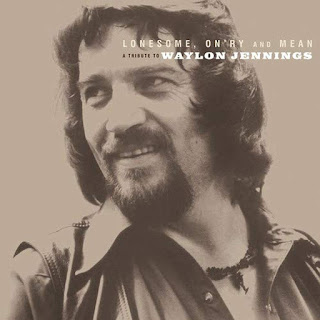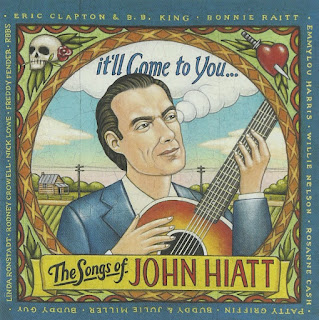Friday, December 15, 2023
The View On Pop Culture: Waylon Jennings, John Hiatt, King Crimson, The Faint (2003)
Considering Waylon Jennings’ near-mythical status in the pantheon of country stars (ranking up there with Hank, George, Johnny, and Willie), a tribute album was bound to happen sooner or later. Lonesome, On’ry and Mean (Dualtone Records) is a labor of love undertaken by Chuck Meade of the alt-country outfit BR5-39. Meade got together a wide range of talent to pay tribute to Waylon and, for the most part, it works. As with any affair of this type, there are good songs and there are better songs and usually there’s a clunker thrown in to pacify some label exec somewhere.
The good stuff on Lonesome, On’ry and Mean includes Dave Alvin’s “Amanda,” his mournful vocals capturing the bittersweet sorrow of the original. Rocker John Doe’s plays it straight with “Only Daddy That’ll Walk The Line,” with pedal steel and honky-tonk piano and vocals that mimic Jennings’ familiar baritone. Guy Clark’s folksy take on “Good Hearted Woman” is solid, as are performances by Nanci Griffith, Junior Brown, and Allison Moorer. Carlene Carter’s rendition of “I’ve Always Been Crazy” reads true, Carter, perhaps more than any of the other contributors, coming closest to sharing Jennings’ rebellious spirit.
On the other hand, Norah Jones seems to have been included for purely commercial purposes, the young Grammy® winner in over her head trying to interpret a song performed by one of country music’s great interpreters. Ditto for Henry Rollins, whose punk credentials may be unassailable, but his heavy-handed, heavy metal reinvention of the title track does nothing but illustrate his limitations as a vocalist. There’s nothing on Lonesome, On’ry and Mean that will make fans forget about Waylon, but it’s a welcome tribute nonetheless and a lot of fun.
John Hiatt has a loyal following of his own, both as a vastly underrated performer and as a successful songwriter. It’s a sign of the respect the music industry has for a favored wordsmith that It’ll Come To You: The Songs of John Hiatt (Vanguard Records) is the third Hiatt tribute album in recent memory. Unlike the aforementioned Jennings tribute, rather than enlisting artists to contribute songs, It’ll Come To You collects (mostly) previously released tracks, throwing in a trio of new songs to whet the average Hiatt fan’s appetite.
Someone once said that it all begins with a song, and when the material has been penned by an artist as intelligent, talented, and well versed in musical tradition as John Hiatt, it’s no wonder that the hits just keep coming. It’ll Come To You includes Hiatt-written hits by Bonnie Raitt (“Thing Called Love”), Eric Clapton and B.B. King (“Riding With The King”) and Roseanne Cash (“The Way We Make A Broken Heart”). There are some lesser-known gems here, as well, such as Rodney Crowell’s take on “She Loves The Jerk” and a haunting reading of “Icy Blue Heart” by Emmylou Harris.
Among the new songs, Buddy and Julie Miller make “Paper Thin” their own with a rocking rendition while Robert Bradley’s Blackwater Surprise delivers a soulful, blues-tinged performance of the title track. It’ll Come To You also includes strong performances from Buddy Guy, Linda Ronstadt and Patty Griffin, among others. Hiatt’s songs, as influenced by Memphis soul as they are by rock, pop and country music, are American treasures. If you’re unfamiliar with Hiatt’s work, It’ll Come To You is a good place to introduce yourself before running out and buying Beneath This Gruff Exterior, Hiatt’s latest solo effort (coming soon to a column near you).
In almost thirty-five years of sporadic music making, King Crimson has never delivered an uninteresting album. Irritating, perhaps, maddening for sure, but never dull. Such is the case with The Power To Believe (Sanctuary Records), the band’s first studio effort in three years and its most adventuresome recording to date. Working with producer Machine, best known for working with nu-metal artists like Rob Zombie and Pitchshifter, the band that defined progressive rock for a generation takes the music into new territory.
The current Crimson line-up of Robert Fripp, guitarists Adrian Belew and Trey Gunn and percussionist Pat Mastelotto manage to take the scattershot improvisational prog-rock that they cut their teeth on and imbue it with the aggressive vocabulary of nu-metal. The result is an invigorating and unpredictable album, songs like “Level Five” and “Dangerous Curves” creating virtual landscapes of sound and emotion. Other tracks on The Power To Believe, such as “Facts of Life,” blend traditional pop structures with a jazzy cacophony, creating an entirely new genre altogether. Young fans of bands like System of A Down would do well to immerse themselves in The Power To Believe and find out what new tricks the old dogs in King Crimson have up their sleeves.
The Faint is a band of new wave revivalists, genuflecting at the altar of early-80s bands like Soft Cell and Human League. So, here’s a novel idea – let’s take the MTV-inspired synth-pop of the Faint’s critically acclaimed album Danse Macabre and turn the songs over to a bunch of hot producers and DJs to remix. The result is Danse Macabre Remixes (Astralwerks Records), a risky musical adventure that pays off in the end.
With talents such as Thin White Duke, Paul Oakenfold and Junior Sanchez reinventing the Faint’s distinctive sound, Danse Macabre Remixes is a blend of straight-forward dance tracks, avant-garde techno and, in some cases, mere minor tweaking and enhancement of the Faint’s original efforts. My personal favorites include the revved-up Oakenfold take on "Glass Dance," the sparse electro-blues of “Total Job” and the Eno-styled ambiance of “Ballad of A Paralysed Citizen.” Danse Macabre Remixes isn’t for everybody, but if you enjoy a bit of edge to your music and crave a little experimentalism, here it is... (View From The Hill, March 2003)
Subscribe to:
Post Comments (Atom)




No comments:
Post a Comment